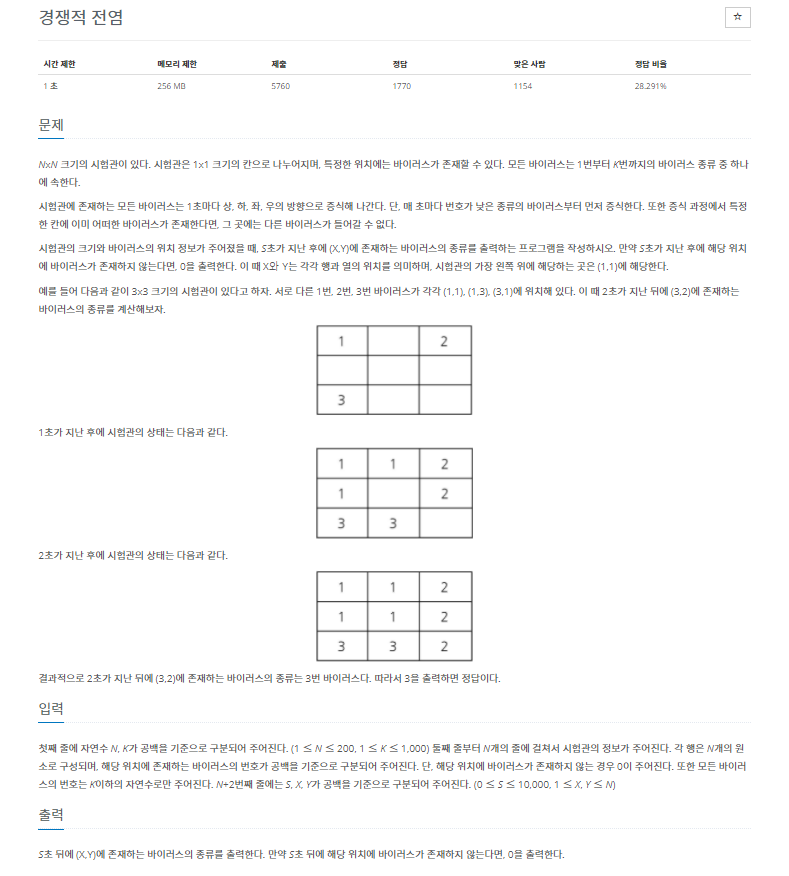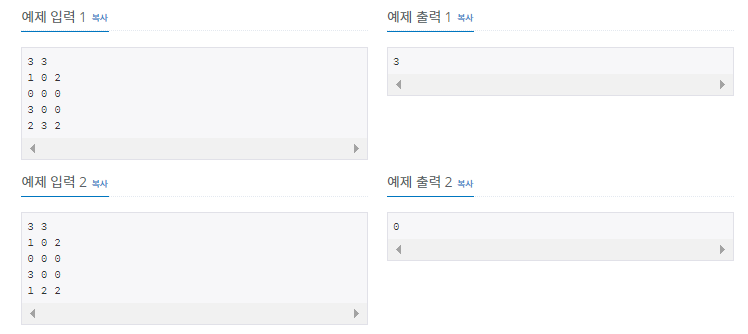백준


1. BFS
from collections import deque
n, k = map(int, input().split())
graph = []
data = []
for i in range(n):
graph.append(list(map(int, input().split())))
for j in range(n):
if graph[i][j] != 0:
data.append((graph[i][j], 0, i, j) )
data.sort()
q = deque(data)
target_s, target_x, target_y = map(int, input().split())
dx = [-1, 0, 1, 0]
dy = [0, 1, 0, -1 ]
while q:
virus, s, x, y = q.popleft()
if s == target_s:
break
for i in range(4):
nx = x + dx[i]
ny = y + dy[i]
if 0 <= nx < n and 0 <= ny < n:
if graph[nx][ny] == 0:
graph[nx][ny] = virus
q.append((virus, s + 1, nx, ny))
print(graph[target_x - 1][target_y - 1])
2. C++
#include <bits/stdc++.h>
using namespace std;
class Virus {
public:
int index;
int second;
int x;
int y;
Virus(int index, int second, int x, int y) {
this->index = index;
this->second = second;
this->x = x;
this->y = y;
}
bool operator <(Virus &other) {
return this->index < other.index;
}
};
int n, k;
int graph[200][200];
vector<Virus> viruses;
int dx[] = {-1, 0, 1, 0};
int dy[] = {0, 1, 0, -1};
int main(void) {
cin >> n >> k;
for (int i = 0; i < n; i++) {
for (int j = 0; j < n; j++) {
cin >> graph[i][j];
if (graph[i][j] != 0) {
viruses.push_back(Virus(graph[i][j], 0, i, j));
}
}
}
sort(viruses.begin(), viruses.end());
queue<Virus> q;
for (int i = 0; i < viruses.size(); i++) {
q.push(viruses[i]);
}
int target_s, target_x, target_y;
cin >> target_s >> target_x >> target_y;
while (!q.empty()) {
Virus virus = q.front();
q.pop();
if (virus.second == target_s) break;
for (int i = 0; i < 4; i++) {
int nx = virus.x + dx[i];
int ny = virus.y + dy[i];
if (0 <= nx && nx < n && 0 <= ny && ny < n) {
if (graph[nx][ny] == 0) {
graph[nx][ny] = virus.index;
q.push(Virus(virus.index, virus.second + 1, nx, ny));
}
}
}
}
cout << graph[target_x - 1][target_y - 1] << '\n';
}


